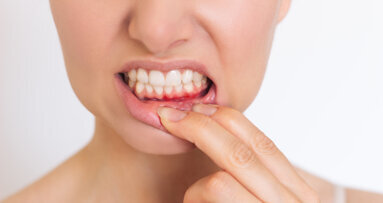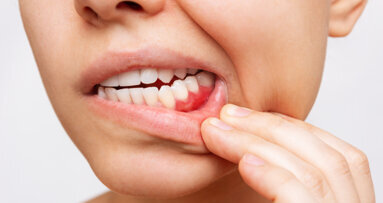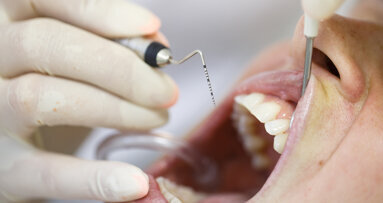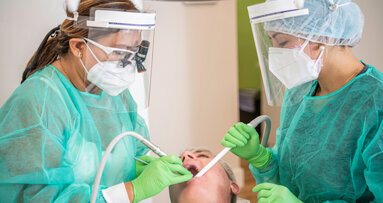COPENHAGEN, Denmark: A study conducted by researchers in France has suggested that people who believe that external factors—such as luck or chance—determine the course of their lives may be more likely to experience severe periodontal disease than those who think their own actions are mainly responsible. The findings were presented last week at the tenth EuroPerio, the leading congress in periodontics and implant dentistry, organised by the European Federation of Periodontology.
The study examined the relationships between people’s beliefs, oral health, and socio-economic and psychological factors. Regarding their belief system, patients were categorised as having an external or internal locus of control. Lead author Dr Sébastien Jungo of Université Paris Cité in France explained in a press release: “Locus of control is the extent to which people believe that the outcomes of life events are due to their own actions (internal locus of control) or factors over which they have little influence (external locus of control). For example, students who fail an exam more readily attribute the result to an outside cause (e.g. difficult exam, bad luck) if they have an external locus of control but to their own mistakes or lack of work if they have an internal locus of control.”
For the study, data on the lifestyle and socio-economic factors of 79 consecutive patients who attended a periodontal consultation at the Bretonneau university hospital in Paris was collected. They completed questionnaires to determine their locus of control, stress level and mood. In addition, the participants’ degree of plaque control and number of teeth were recorded, and they were taught how to perform good oral hygiene.
It was determined that 20 patients (25%) had an external locus control and 59 (75%) an internal one. The median depressed mood score was twice as high in the first group, compared with the second. With regard to education levels, the researchers found that approximately 75% of the external locus group had a low education level, compared with around 50% of the internal locus group.
In a follow-up approximately two weeks later, severity of periodontal disease was assessed by measuring bleeding on probing, pocket depth and maximum attachment loss. The research team found the average number of lost teeth was three for the external locus group and one for the internal locus group. The maximum attachment loss was significantly higher in the external locus group than in the control group.
“The finding that this belief system is linked with oral health should encourage dental professionals to assess the emotional state of their patients and, if necessary, refer them to appropriate psychological care,” commented Dr Jungo. “A few simple questions should be asked, such as: ‘According to you, what causes your disease?’ and ‘How can it be treated?’. Answers to these questions could be important for optimising adherence to treatment.”
The research team conducted statistical analyses to examine the association between locus of control, oral health status, and socio-economic and psychological factors, adjusted for factors that might influence the relationships. External locus of control belief was significantly associated with depression score, education level, number of teeth and maximum attachment loss.
“Having an external locus of control was independently associated with more tooth loss and attachment loss, indicating greater severity of periodontitis,” said Dr Jungo.
He continued: “In addition, these patients were more likely to be depressed and have a lower education level. The findings suggest that this group may need encouragement to consider periodontitis a manageable disease, particularly if they are feeling low.”
Tags:
KUOPIO, Finland: Stroke is the second leading cause of death globally, and periodontitis has been shown to be associated with an increased risk of ischemic ...
AARHUS, Denmark: Smoking can greatly affect periodontitis treatment—these are the findings of a recent study that investigated the influence of different ...
UPPSALA, Sweden: Over a decade of national data has shed new light on the developmental trajectories of dental caries in Swedish children and adolescents. ...
HELSINKI, Finland: The prevalence of adult periodontitis continues to pose a major global public health challenge, highlighting the need for evidence on the...
OSLO, Norway: Alleviating stress for fearful dental patients, especially vulnerable ones such as children, is of paramount concern for dentists. Now, a ...
MALMÖ, Sweden: Even though Sweden has built a more robust healthcare system than exists in many countries, adults in the country still have a high ...
OSLO, Norway: The widespread availability of vaccines in developed nations has significantly changed the risk of dentists contracting SARS-CoV-2 in a ...
Few experiences evoke as much fear as sitting in the dental chair—especially for those whose trust was broken early in life. Bridging the fields of ...
COPENHAGEN, Denmark: 3Shape has announced a leadership transition that honours one of its most influential innovators. After 25 years at the forefront of ...
COPENHAGEN, Denmark: Traumatic dental injuries to the primary dentition, particularly luxation events such as intrusion, avulsion, lateral luxation and ...
Live webinar
Tuesday, 24. February 2026
19:00 CET (Oslo)
Prof. Dr. Markus B. Hürzeler
Live webinar
Tuesday, 24. February 2026
21:00 CET (Oslo)
Prof. Dr. Marcel A. Wainwright DDS, PhD
Live webinar
Wednesday, 25. February 2026
17:00 CET (Oslo)
Prof. Dr. Daniel Edelhoff
Live webinar
Wednesday, 25. February 2026
19:00 CET (Oslo)
Live webinar
Thursday, 26. February 2026
02:00 CET (Oslo)
Live webinar
Tuesday, 3. March 2026
17:00 CET (Oslo)
Dr. Omar Lugo Cirujano Maxilofacial
Live webinar
Wednesday, 4. March 2026
02:00 CET (Oslo)
Dr. Vasiliki Maseli DDS, MS, EdM



 Austria / Österreich
Austria / Österreich
 Bosnia and Herzegovina / Босна и Херцеговина
Bosnia and Herzegovina / Босна и Херцеговина
 Bulgaria / България
Bulgaria / България
 Croatia / Hrvatska
Croatia / Hrvatska
 Czech Republic & Slovakia / Česká republika & Slovensko
Czech Republic & Slovakia / Česká republika & Slovensko
 France / France
France / France
 Germany / Deutschland
Germany / Deutschland
 Greece / ΕΛΛΑΔΑ
Greece / ΕΛΛΑΔΑ
 Hungary / Hungary
Hungary / Hungary
 Italy / Italia
Italy / Italia
 Netherlands / Nederland
Netherlands / Nederland
 Nordic / Nordic
Nordic / Nordic
 Poland / Polska
Poland / Polska
 Portugal / Portugal
Portugal / Portugal
 Romania & Moldova / România & Moldova
Romania & Moldova / România & Moldova
 Slovenia / Slovenija
Slovenia / Slovenija
 Serbia & Montenegro / Србија и Црна Гора
Serbia & Montenegro / Србија и Црна Гора
 Spain / España
Spain / España
 Switzerland / Schweiz
Switzerland / Schweiz
 Turkey / Türkiye
Turkey / Türkiye
 UK & Ireland / UK & Ireland
UK & Ireland / UK & Ireland
 International / International
International / International
 Brazil / Brasil
Brazil / Brasil
 Canada / Canada
Canada / Canada
 Latin America / Latinoamérica
Latin America / Latinoamérica
 USA / USA
USA / USA
 China / 中国
China / 中国
 India / भारत गणराज्य
India / भारत गणराज्य
 Pakistan / Pākistān
Pakistan / Pākistān
 Vietnam / Việt Nam
Vietnam / Việt Nam
 ASEAN / ASEAN
ASEAN / ASEAN
 Israel / מְדִינַת יִשְׂרָאֵל
Israel / מְדִינַת יִשְׂרָאֵל
 Algeria, Morocco & Tunisia / الجزائر والمغرب وتونس
Algeria, Morocco & Tunisia / الجزائر والمغرب وتونس
 Middle East / Middle East
Middle East / Middle East












































To post a reply please login or register